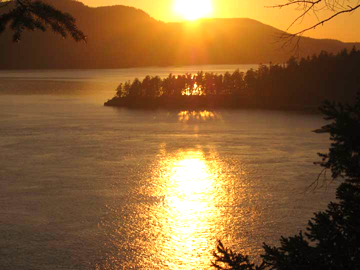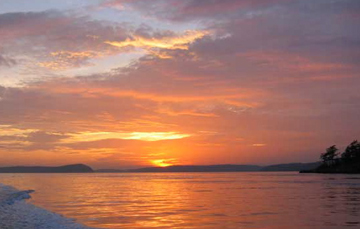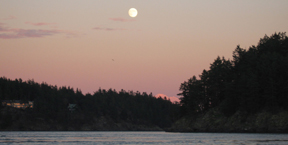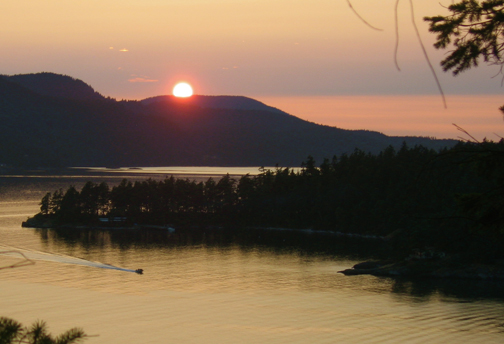
Often we are asked at an evening event on Orcas, “You’re not going back to Obstruction Island tonight, are you?”
“Of course we are. That is our home.”
“But you have to cross the water in the dark!”
This fear always startles me. Are we not all Island People? We are not on the flat plains of Kansas, landlocked with a dry wind blowing. Everyone here chose to live surrounded by the sea. It defines us.
I am more afraid of driving through Seattle at night changing lanes in order to exit, than of crossing the short mile to Obstruction Island. Freeway driving can be out of your control no matter how good a driver you are. True, the sea is a worthy adversary to be met with respect but there is a predictability to it. And crossing the water at night can be an experience of breathless splendor.
There was a night when the full moon hung low over Mt. Baker. The dark water and the dark of the island seemed coated in velvet. You needed to whisper, if you talked at all.
There have been nights of florescent wakes mirroring the spangle of stars in the sky. If you are rowing, the oars cut through the dark water with a ribbon of phosphorescence. Bright bubbles drop from their tips and stream along the water.
One time when we were returning with a young grandson, the sea beneath us was packed with an undulating mass of fish, each encased in an armor of phosphorous bubbles. We cut the motor and drifted, watching their synchronized rhythms; an evening to remember.
It reminds me of the September before I moved here and was teaching a watercolor workshop (1991). A student friend of mine and I rowed to Obstruction. We cooked over a campfire joining the couple who were building my original little cabin. Returning, my friend sat on the stern seat. This woman, always so tense and determined in class, threw handfuls of sea water into the air. The air exploded with bubbles of phosphorescence around her. She was dissolved in the merry laughter one usually hears only in the voices of young children.

Another late afternoon in December when returning with groceries, the full moon rose over Mt. Baker while the sun was dropping behind Lopez. As I rowed I could see them and felt suspended between the two.

There are mornings, hurrying to catch the red-eye, that I have rowed across as the sun turns first the distant clouds to the west a pink cotton and next strikes the ones over the Cascades with gold. There are crossings with the gentle mists slipping through the trees. Occasionally a seal follows.
I remember coming into a parking lot with a city friend. “How beautiful!” she cried, as she spotted a full moon above the telephone poles and buildings. The moon seemed out of place to me. Didn’t it belong up above the firs? It is easier for those of us who live in these Islands to be in touch with the universal rhythms of the rise and setting of the sun and the moon, the ebb and flow of the tides, and the directions and strength of the winds. It seems to me that it is in tuning to these rhythms, we find peace of mind. Rather than deprived, I feel fortunate that I can live on an outer island where, of necessity, one must consider the tides and winds as part of one’s day.
Caroline Buchanan

©2009
First published on July 15, 2009 by Sound Publishing, Inc. and circulated with The Islands’ Sounder, The Islands Weekly, and The Journal of the San Juans. It was written in part because with the first story, Hanging Out the Wash (Ode to a Clothesline) the paper has mistakenly identified me as living on Orcas. When I protested, they said that they hoped I would continue writing of life on our island and suggested the next installment make it clear that we were not residents of Orcas.
